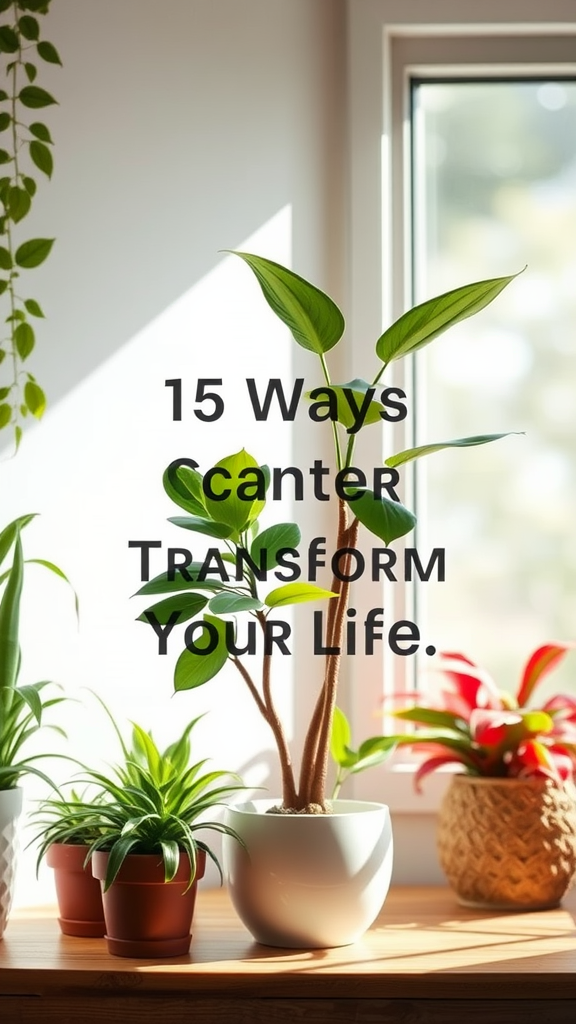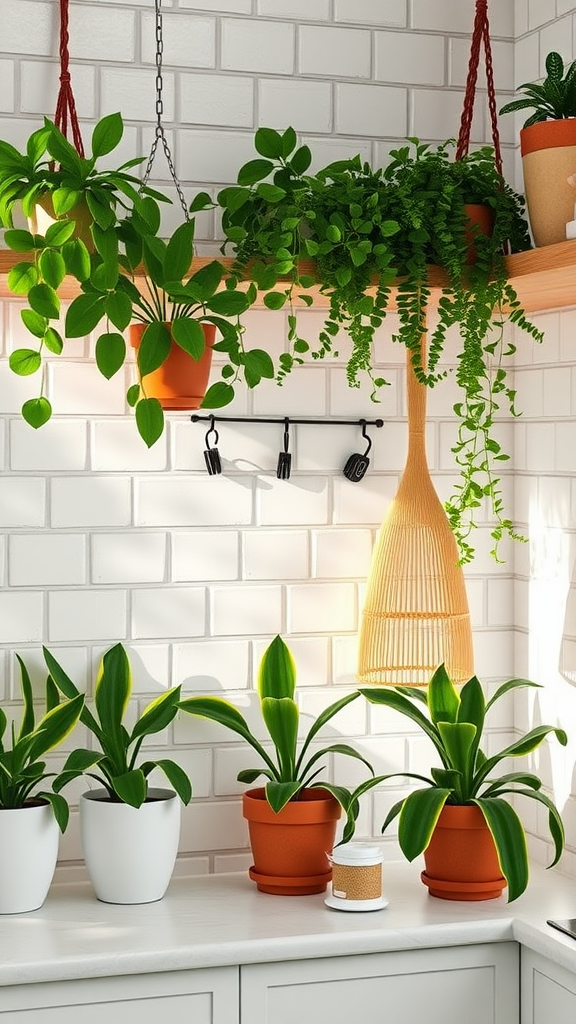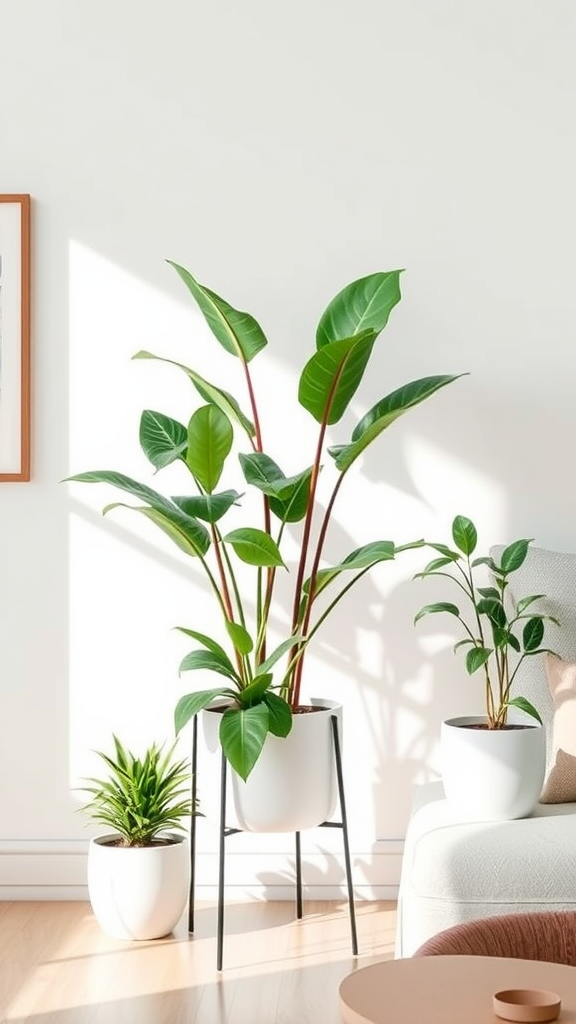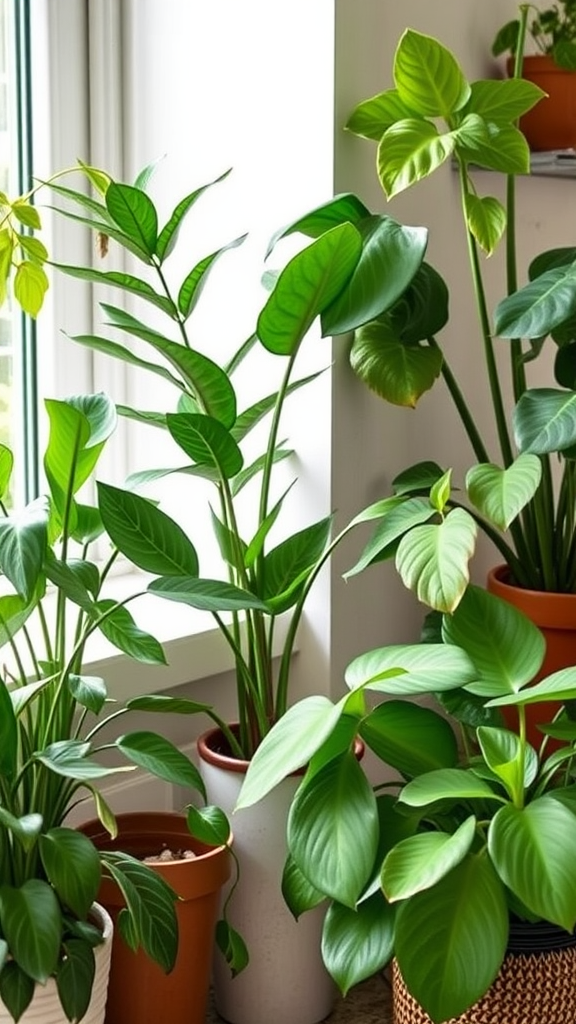The Life-Changing Benefits of Incorporating Plants Into Your Daily Routine
Many people overlook the potential benefits that plants can offer in their daily lives. greenery into your routine can change your life in ways you may never have imagined. From enhancing your mood to improving air quality, here are 15 ways plants can transform your life.
1. Boost Your Mood
Studies have shown that having plants around can significantly boost your mood. Whether it’s a succulent on your desk or a potted fern on your windowsill, plants add a splash of color and life that can make your space feel more inviting.
2. Purify the Air
Plants are natural air purifiers. They can help reduce common toxins found in indoor air, such as formaldehyde and benzene. By incorporating plants into your home or workspace, you can create a healthier environment for yourself and your loved ones.
3. Improve Focus and Productivity
Having plants nearby can enhance your focus and productivity. Research indicates that exposure to greenery can lead to better concentration. This is particularly beneficial in work environments where distractions are plentiful.
4. Reduce Stress
Plants can act as a calming presence in our lives. The mere act of tending to a plant can be therapeutic, allowing you to reconnect with nature and relieve stress. Consider adding a plant to your workspace to help mitigate daily stressors.
5. Enhance Creativity
If you’re looking to boost your creativity, add plants to your surroundings. The vibrant colors and textures of plants can inspire new ideas and help you think outside the box.
6. Improve Humidity
Plants naturally release moisture through a process called transpiration. This increase in humidity can benefit your skin and respiratory health, especially in dry climates or during winter months.
7. Encourage Physical Activity
Caring for plants can inspire you to be more physically active. Watering, pruning, or even moving plants can encourage you to get up and move around rather than being sedentary.
8. Promote Better Sleep
Certain plants, like lavender and jasmine, are known for their calming effects that can improve your sleep quality. these into your bedroom can create a serene atmosphere perfect for restful sleep.
9. Enhance Nutrition
If you have a green thumb, growing your own herbs and vegetables can improve your nutrition. Having access to fresh produce right in your home can encourage healthier eating habits and save you money at the supermarket.
10. Foster Social Connections
Plants can serve as a great conversation starter. Joining a plant club or sharing tips with friends can create a sense of community. By cultivating plants together, you strengthen bonds and encourage meaningful relationships.
11. Aid Recovery from Illness
Research suggests that having plants in healing spaces, such as hospitals or rehabilitation centers, can speed up recovery. The comforting presence of greenery can significantly assist in improving overall well-being.
12. Teach Responsibility
Caring for plants teaches responsibility, whether it’s for children learning at home or adults looking to build new habits. You gain a sense of accomplishment as you nurture your plants and see them thrive.
13. Create a Personal Oasis
Turning your space into a green oasis can provide you with a personal retreat from the chaos of daily life. Having a dedicated area filled with your favorite plants can become a comforting escape.
14. Environmental Benefits
Plants into your home contributes positively to the environment. Plants absorb carbon dioxide and release oxygen, which helps combat climate change on a small scale.
15. Connect with Nature
Bringing plants into your life helps connect you with nature, even in an urban setting. This connection can enhance your sense of well-being and remind you of the beauty of the natural world.
The benefits of incorporating plants into your daily routine are plentiful. Whether you’re seeking to improve your mood, enhance your health, or create a vibrant space, the presence of plants can be a transformative element in your life.
Exploring the Connection Between Nature and Mental Well-Being
Nature has a profound impact on our mental health and well-being. In today’s fast-paced world, finding a moment to connect with the great outdoors can feel like a luxury. However, immersing yourself in nature doesn’t just provide a pleasant escape; it can also significantly enhance your mental health. Understanding the connection between nature and mental well-being can inspire you to step outside more often.
One of the main ways nature benefits your mental well-being is by reducing stress. Spending just a few minutes in a green space – whether it’s a park, a garden, or a forest – can help lower levels of cortisol, the stress hormone. By taking time outdoors, you give your mind a break from the chaos of daily life, promoting relaxation and clarity.
Furthermore, exposure to natural light has a positive effect on mood and can help improve your sleep cycle. The sun’s rays increase the production of serotonin, a mood-lifting neurotransmitter, which contributes to feelings of happiness. A simple walk during daylight can elevate your mood and boost your energy levels.
Another significant aspect of nature is its ability to foster mindfulness. Immersing yourself in natural surroundings encourages you to be present in the moment. Whether you’re observing the gentle sway of trees or listening to birds chirping, nature has a unique way of grounding you. Practicing mindfulness in nature can enhance your overall well-being and promote a positive mindset.
Engaging with nature is also known to enhance creativity. Inspiration often strikes when your mind is at ease. When you step away from screens and immerse yourself in green spaces, you give your brain the freedom to wander, leading to new ideas and problem-solving approaches. Even a short hike can provide fresh perspectives on challenges you may be facing.
Physical activity is another key benefit of spending time outdoors. Whether you’re hiking, jogging, or simply walking, engaging in physical exercise releases endorphins, often termed “feel-good” hormones. The combination of physical activity and the beauty of nature can produce feelings of joy and promote mental clarity.
The connection between nature and social interaction should not be overlooked. Participating in outdoor group activities, such as community gardening or hiking clubs, can foster new friendships and strengthen connections with others. Social interactions, in turn, play a crucial role in maintaining mental health by providing support and reducing feelings of loneliness.
Moreover, being around plants and greenery can also be beneficial. Studies show that indoor plants can improve concentration, reduce fatigue, and even boost your productivity. Filling your workspace with plants not only brightens up your environment but also makes it easier for you to think clearly and feel good throughout your workday.
Here are some specific actions you can take to explore your connection with nature and enhance your mental well-being:
- Take Regular Nature Walks: Dedicate time each week for walks in parks or natural settings.
- Gardening: Both indoor and outdoor gardening can be therapeutic and rewarding.
- Practice Mindfulness: Spend 10 minutes a day sitting quietly in a garden or park, focusing on your surroundings.
- Join a Nature Group: Look for local organizations that focus on outdoor activities to meet like-minded friends.
- Enjoy the Sunlight: Move your work or leisure activities outside when possible to soak up the sun.
These practices into your routine can lead to profound improvements in your mental health. By engaging with nature, you can cultivate a healthier mindset and rediscover a sense of peace. It’s not only about escaping the hustle of daily life; it’s about reconnecting with what feeds your soul.
In the hustle and bustle of modern life, taking time to appreciate nature is essential for mental well-being. Each moment spent outside is an investment in your happiness and peace of mind. Start small, embrace the outdoors, and experience the calming effects nature has on your life. You may be surprised by the transformation it brings.
Conclusion
Plants into your daily routine offers incredible life-changing benefits that enhance both your physical and mental well-being. You may find that just by surrounding yourself with greenery, you’re creating an oasis of tranquility in your home or workspace. From purifying the air to reducing stress, plants serve as a natural remedy that fosters a healthier environment. Their presence goes beyond aesthetics, inviting a calming influence that can uplift your mood and spark joy in your everyday life.
The profound connection between nature and mental health is increasingly recognized, and engaging with plants can be an essential part of this relationship. Nurturing a plant not only provides a sense of responsibility but also offers a gentle reminder of growth and renewal. Studies show that spending time with nature, such as tending to your plants or simply enjoying their beauty, can significantly reduce anxiety and depression. Embracing this connection fosters mindfulness, allowing you to tread gently through life, focusing on the present moment.
By making the decision to integrate plants into your daily life, you invest in your overall well-being. The benefits are vast, and your journey towards a healthier lifestyle begins with the simple act of bringing nature indoors. So, whether you cultivate a small herb garden in your kitchen or create a lush indoor jungle, remember that each leaf and bloom has the power to transform your life in ways you may never have imagined. Embrace the change, and let the healing touch of plants enrich your every day.





